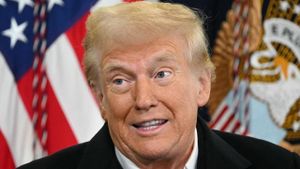MEXICO CITY — The simmering tensions between the United States and Mexico reached new heights recently when President Donald Trump announced sweeping 25% tariffs on Mexican imports, claiming the need to address illegal immigration and drug smuggling, particularly the influx of fentanyl. Mexico's President Claudia Sheinbaum has responded vehemently to what she describes as slanderous accusations by the White House, asserting there is no government alliance with drug cartels. This declaration marked the beginning of serious retaliatory measures from Mexico, aiming to protect the country's economic interests.
On February 1, 2025, as the US officially imposed the tariffs on both Mexican and Canadian goods, Sheinbaum directed economy minister Marcelo Ebrard to put “Plan B” — a framework including both tariff and non-tariff measures — fully to action. “We categorically reject the White House's slander against the Mexican government for having alliances with criminal organizations,” Sheinbaum stated on her social media platform, X. The Mexican president firmly maintained her government’s alleged association with organized crime is unfounded and emphasized the cooperation between neighboring countries should be focused on mutual respect and shared responsibility.
Trump's tariffs did not come as a surprise, but they escalated already tense diplomatic relations, igniting fears of economic fallout for both Mexico and Canada. According to reports, more than 80% of Mexico's exports are directed to the US, meaning such tariffs could result in devastating impacts on its economy, with analysts warning of possible recession. Economic experts at Banco BASE estimate these tariffs could lead to nearly 12% drops in exports and diminish Mexico's gross domestic product by as much as 4% if maintained throughout the year. “This is a flagrant violation of our free trade agreement,” Ebrard remarked, describing the tariffs as harmful not only to Mexico but potentially jeopardizing jobs across North America.
While retorting to the US tariffs, Sheinbaum proposed various counter-tariffs and urged for dialogue rather than punitive economic measures. “Problems are not resolved by imposing tariffs,” she stated strongly, encouraging collaboration and integration rather than confrontation. She underscored Mexico’s established commitment to combating drug trafficking, highlighting significant drug seizures of over 40 tons and the arrest of thousands involved with organized crime within her administration’s first four months.
The response from Canadian Prime Minister Justin Trudeau was equally immediate, noting how reciprocal tariffs could threaten jobs and worsen supply issues for American consumers, saying explicitly, “Tariffs against Canada will put your jobs at risk.” Trudeau emphasized how these tariffs would push up costs for everyday Americans, potentially impacting various sectors from automobiles to groceries. This escalation of trade disputes taps deeply rooted issues connecting the two neighboring countries.
Sheinbaum's administration has attested to the damage wrought by illegal arms flows from the United States, claiming, “If there is such an alliance anywhere, it is in the US gun shops. If the United States wants to combat this issue, the guns need to be addressed.” Her administration calls for the US to address its gun laws to mitigate the flow of weaponry to drug cartels, which they argue contribute significantly to the violence and instability within Mexico.
The rhetoric from both sides suggests the potential for a drawn-out conflict, with diplomatic negotiations appearing tenuous. While Trump has framed the tariffs as necessary to shield American citizens from the purported dangers posed by illegal immigration and drug smuggling, politicians and analysts across both countries indicate the risks of approaching the matter through tariffs alone. Consumers, businesses, and economies hang precariously on the brink as both nations navigate this charged situation.
“Coordination, yes; subordination, no,” Sheinbaum emphasized, distinguishing her approach from subjugation. She proposed creating collaborative working groups focused on public health and security to address these shared challenges, reinforcing her stance for dialogue. Reflecting on past communications between Mexico and the US to settle issues surrounding migration, she stated, “We must take these conversations beyond tariffs.” This sentiment echoes widely as both countries weigh the ramifications of their actions on international relations.
With the specter of retaliatory tariffs looming large, the path forward hinges on how both nations manage their precarious economic, social, and political landscapes. The call for dialogue and investment rather than punitive tariffs could lead the way toward constructive conflict resolution. For now, the situation remains fluid, reflecting the interconnected nature of the economies and people who reside on both sides of the border.



